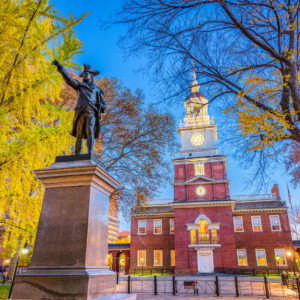Editor’s Note: For another viewpoint, see Counterpoint: Protecting Our Freedoms Through the For the People Act.
On July 4 some 245 years ago, the signing of the Declaration of Independence articulated the political ethos of the United States: A country founded on the consent of the governed and rooted in the idea that governments exist to protect the natural rights of the citizens. Eleven years later, delegates met in the same place to draft a Constitution that would, they hoped, institutionalize those founding principles.
How are things going today? Not so well on the governing front despite positive developments for human freedom.
The structural aspects of our Constitution — those that delineate the various responsibilities for the branches of government — are badly damaged. Congress has largely delegated to the president its constitutional role to pass laws. The president and his agents can make sweeping changes to our policies at the stroke of a pen.
While the Constitution exclusively vests lawmaking power in the legislative branch, Congress hardly functions anymore, preferring partisan complaining over lawmaking and preferring to pass thousand-plus page bills that no member has the time to read or consider. For example, the original bill creating the federal income tax in 1913 was 14 pages long, while the 2010 Affordable Care Act was more than 2,500 pages. And much of the ACA merely authorizes agencies to pass further regulations, which number tens of thousands of pages at this point.
In short, no one, whether a voter, senator, lobbyist, or even the Speaker of the House, knows what’s actually in these bills when they are passed.
The Framers — every one of them — would be astounded at how much our structural Constitution has broken down. We have a Congress that doesn’t govern, a president and agencies that govern too much, and a military that has engaged in countless acts of violence against other countries — from the Korean War to Vietnam to Iraq and Afghanistan — without a constitutionally mandated congressional declaration of war. In fact, Congress hasn’t declared war since World War II.
The Framers would also be shocked at our penchant for turning everything into a national issue. Political fights over education, health care, criminal justice, and more increasingly happen on a national level. That’s odd because the Framers would be surprised we even have a federal Department of Education or Health and Human Services. Those quintessentially local issues were left by the Constitution to the states.
At the time of the independence, just as now, the 13 original colonies were wildly different in culture, language and religion. The idea that South Carolina and Massachusetts should both be subject to a centralized education or health care system would have been seen as ludicrous and dangerous. Ludicrous because there would be no way such different states could agree on basic principles, and dangerous because it could engender hatred and divisiveness within the union.
The valid concern that over-centralization would be both dangerous and unworkable was true when there were 13 states and 4 million people, and it is even more true with 50 states and 330 million. Every four to eight years, our polarized political parties try to use our broken constitutional government to stick it to the other side. Why? Because they did it last time, so now it is their turn.
Fundamentally, for understandable reasons, Americans don’t feel represented in Washington, and that sentiment is manifesting as resentment and despondency at best or elaborate and insane conspiracy theories at worst. It might seem like a relatively small group of people actually run our country because it’s largely true. The president, agency heads, mid-level political appointees, and civil servants do most of the governing because Congress has continually asked them to.
It’s all quite disheartening and it might take an incredible act of political will — almost akin to the ratification of the Constitution — to work our way out of the quagmire we’re sliding deeper into.
Yet, despite reasons for pessimism, we must also acknowledge the incredible gains to human freedom we’ve seen in this country since the Founding. The Constitution’s guarantee of equality and freedom was an empty promise to the millions of enslaved African Americans. After the bloody Civil War, the 13th, 14th, and 15th amendments rectified that grievous error in the text, although much work still needed and needs to be done. We’ve recently seen major victories in the right to marriage equality, and Connecticut recently became the 19th state to legalize adult recreational marijuana.
These victories show that progress toward a freer and more just America is possible, but the fight will be hard — just like it was in 1776.





